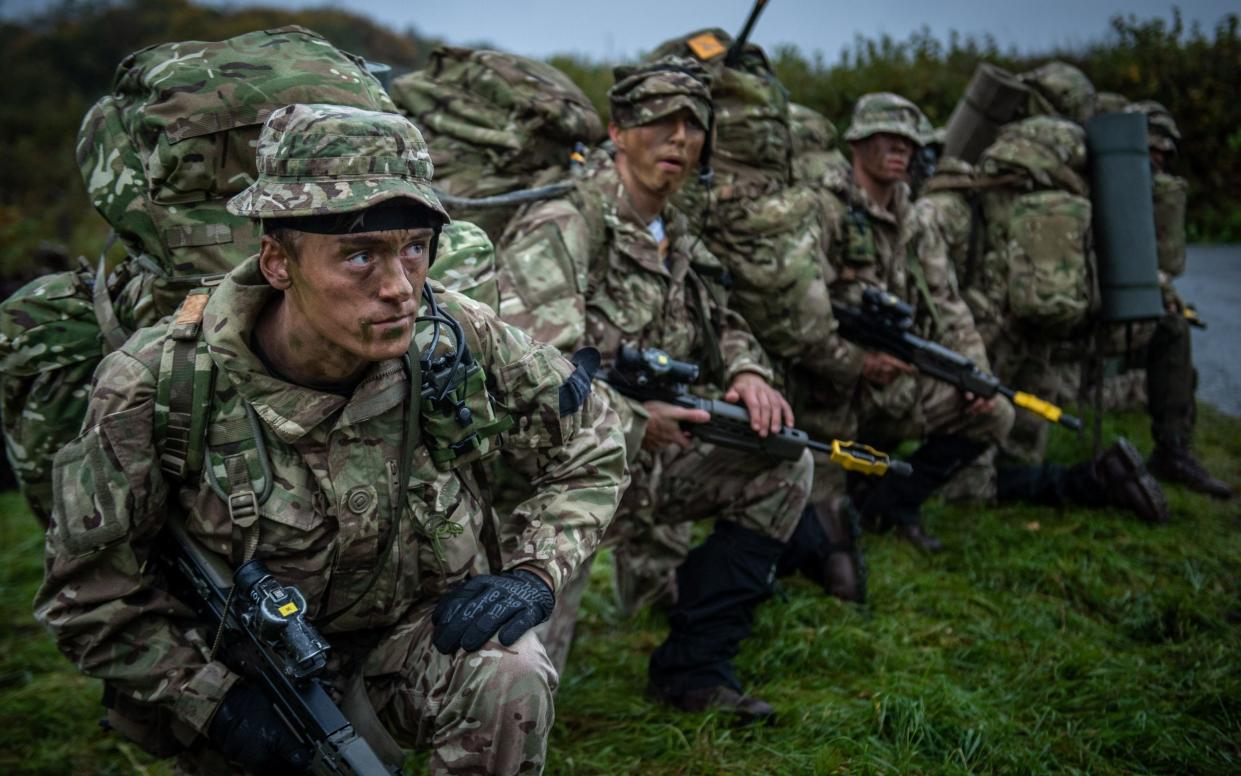Recruit soldiers with tattoos and asthma to solve intake crisis, MPs told

- Oops!Something went wrong.Please try again later.
Soldiers who have visible tattoos, hayfever or a record of asthma should be taken on to help solve the recruitment crisis, MPs have been told.
The suggestions were made by Capita, the outsourcing giant in charge of recruitment for the Army, amid the staffing crisis engulfing the military. Recent official government figures have shown that in the 12 months to March, intake for the Army dropped by almost 15 per cent.
In an appearance before the Commons defence select committee, Maria Mallet, the chief operating officer for Capita’s recruiting partnering project, explained how the company was looking to employ candidates that would not normally meet the Army’s exacting standards.
MPs were told that Capita had so far succeeded in reducing the number of years candidates had to have been clear of asthma before they could join the Army. Having already halved the time from four to two years “clear” of asthma, they revealed they have since made the proposition that it should be reduced further to just one year.
Referring to a “deferred” period of hayfever, Ms Mallet said Capita has suggested to the Ministry of Defence (MoD) that the period of a candidate having suffered with hayfever should also be reduced. “We are saying to shorten that period like they have with asthma,” she said, adding that Capita “haven’t had an OK yet” from the MoD.
‘Common sense at last’
Richard Drax, a senior Tory MP, told the committee that he was glad common sense had prevailed regarding the allergy, as he suggested Sir David Stirling, who founded the SAS in 1941, would not have let such inconveniences get in the way of good soldiering.
“On hayfever, I’m so glad to hear what you’ve said, common sense at last,” Mr Drax said. “I cannot believe, for example, that some of David Stirling’s men did not have hayfever, but they did pretty well. I think this whole thing has got to be sorted out.”
Similarly, they have succeeded in recruiting candidates with the skin condition dermatitis, as long as it is “mild”. Since this exception was granted, 13 candidates have been accepted by the Army.
Meanwhile, while tattoos visible on hands and above the collar have previously been forbidden on personnel, Capita have taken candidates through the recruitment process with the knowledge that they may have to remove the tattoos if successful.
For those who cannot afford to pay for such procedures, a “hardship fund” has been made available to provide financial assistance.
In 2012, Capita was awarded a 10-year contract by the MoD to work on its recruitment. In 2020, this was extended by two years.
However, the recruiter revealed to MPs that it was only filling 22 per cent of key roles amid the recruitment crisis and admitted it was “barely” recruiting one in five people it needs for 73 specialist roles, which include HR and communications specialists, as well as engineers, IT specialists and those working in intelligence.
This year, having been tasked with recruiting 9,813 people, Capita admitted it has so far only recruited 5,000.
Ms Mallet confirmed it was correct when asked by Mark Francois, a former Armed Forces minister, that Capita has so far “barely recruited half of the people they need”.
However, Richard Holroyd, the chief executive of public service at Capita, insisted the group was “throwing everything” at the recruitment crisis.
“We recognise the importance of this to the nation and to the Armed Forces which we serve,” he told the committee. “So we are completely committed to working to drive recruiting up.”
A Ministry of Defence spokesman said: “All three services continue to meet their front-line operational commitments. Recruitment is a top priority, which is reflected in the Haythornthwaite Review and Defence Command Paper publications.
“These set out measures to address recruitment challenges including making it easier for people to re-join, improved career opportunities and pay. Investing in our people matters and this is why we have funded a number of trials and pilots to increase recruitment and retention, alongside awarding the largest pay increase in over 20 years.”

